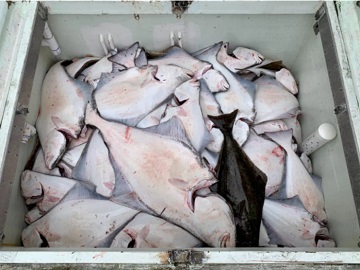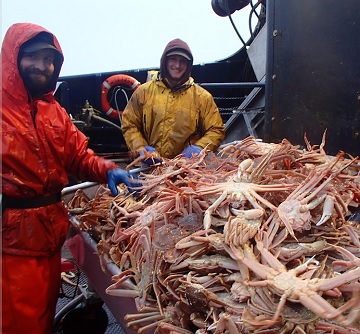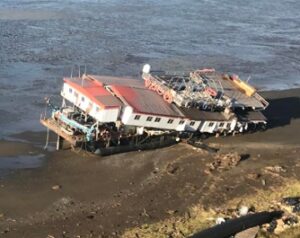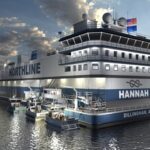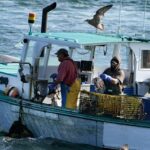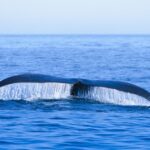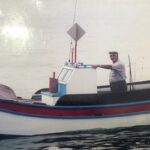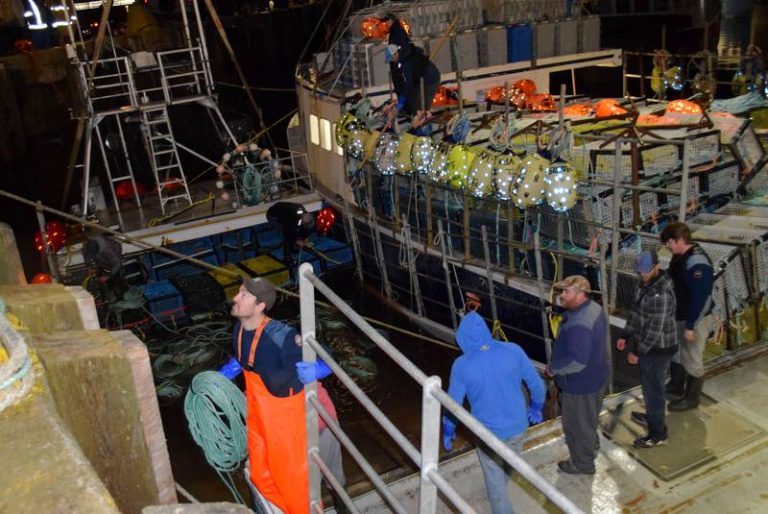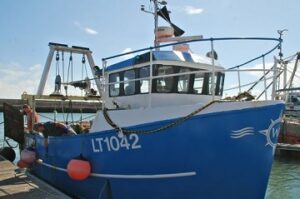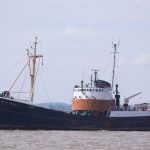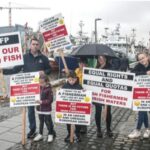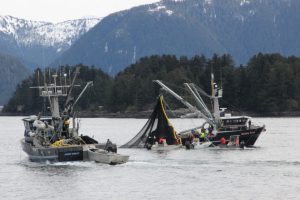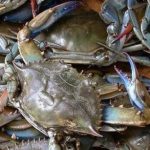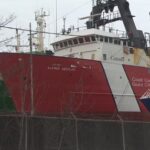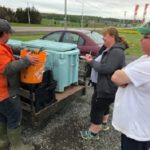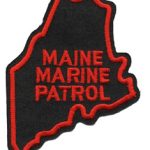Tag Archives: Alaska

Commercial Fisherman Alf Ludvig Forde of Mukilteo, Washington has passed away
Alf Ludvig Forde (80) died peacefully at home in Mukilteo, Washington in the early morning January 4th, 2023 of natural causes. Alf was born November 9th, 1942 to Alf and Odney Forde in Ketchikan, Alaska. Alf was an Alaskan commercial fisherman. He started fishing on his dad’s boat at a young-age, eventually owning 2 halibut longliners and 3 Bering Sea crab boats. Alf built his business through hard work and honesty. He was respected as an extremely fair person not only with partners, but also among crew, fish buyers and professionals throughout the industry and beyond.
Alf’s greatest personal achievement was his family. >click to read< 15:26
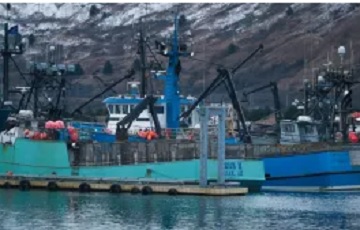
It’s been more than a week, and Kodiak’s Tanner crab stand down continues
Crabbers in Kodiak still haven’t come to an agreement with the island’s canneries on prices for this year’s harvest. And this weekend, the fleet voted again to continue standing down – with no plans to meet again until they get a better offer from processors. Kodiak’s fleet voted down an offer from local processors for $3.25 per pound for Tanners on Friday. Canneries had initially offered $2.50 per pound ahead of the season. And Sunday night, crabbers voted to press pause on the season altogether until they get a price from canneries they think is fair. “We all thought we were going to be fishing, but we all understand why we aren’t fishing,” said Kevin Abena the secretary and treasurer for the Kodiak Crab Alliance Cooperative, which represents permit holders in the fishery. “So, we’re just waiting.”>click to read< 10:59
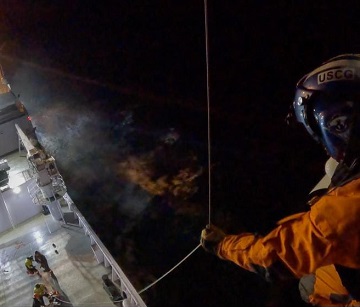
Coast Guard medevacs man from fishing vessel near Dutch Harbor, Alaska
A Coast Guard Air Station Kodiak aircrew, forward deployed to Cold Bay, medically evacuated a mariner from a fishing vessel near Dutch Harbor, Tuesday morning. The MH-60 Jayhawk helicopter aircrew hoisted the 47-year-old man from the 310-foot fishing vessel F/V Northern Eagle and transported him back to Cold Bay for a wing-to-wing transfer with LifeMed Alaska personnel. Watchstanders at the Coast Guard 17th District command center, in Juneau, received the initial request for the medevac Tuesday at 5:55 a.m. from the vessel’s crew that a fellow crew member had injured his right hand. >click to read< 20:52
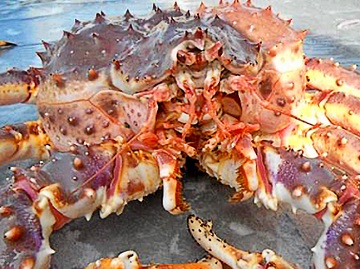
NOAA denies emergency request to close red king crab savings areas
The National Oceanic and Atmospheric Administration has denied an emergency request Friday to close crucial habitat for Bristol Bay red king crab to all types of commercial fishing. That comes after Alaska Bering Sea Crabbers petitioned in late September for a closure of the red king crab savings areas to protect the species during a time of historically low stocks. The savings area was established in 1996 and is permanently closed to bottom trawling, but it remains open to midwater trawlers, pot fishing and longlining. Bottom trawling is allowed, however, in a small section within the savings area, known as the savings subarea, when Bristol Bay red king crab is not open to directed fishing. >click to read< 09:15
Press release – NOAA Fisheries Denies Request for Emergency Action to Close the Red King Crab Savings Area and Subarea – >click to read<
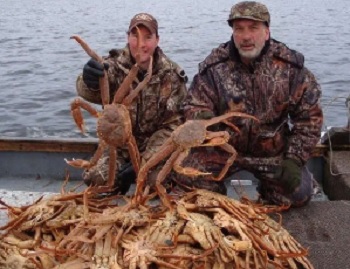
Fishermen stand together in a show of solidarity against low prices
“We have solidarity among all groups,” said Kevin Abena of Kodiak, skipper of the F/V Big Blue and secretary and treasurer for the Kodiak Crab Alliance Cooperative (KCAC) which represents 121 permit holders. Attempts to reach local processors were unsuccessful. The cooperative is now securing tenders to take the local crab to Dutch Harbor and potentially King Cove. “It’s sad for the community that every bit of this crab could be walking out of town,” Abena said. “But we are not going fishing for $2.50 a pound.” The crabbers are not facing a time crunch. The Tanner crab fishery can remain open by regulation until March 1. “We decided the 16th to stand down until the 22nd. So the earliest we will go fishing is the 22nd at noon. We have an association meeting on Friday at 6pm. >click to read< 11:05
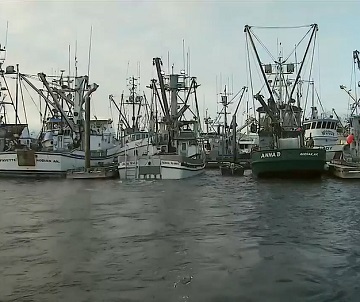
Kodiak waters remain quiet as fishermen demand higher price for crab
Captain of the F/V Isanotski Shawn Dochterman said that fishermen are not heading out to drop crab pots. “At the present time, every vessel between the Alaska Peninsula and Kodiak are standing down to get a fair and equitable price,” Dochtermann said. Commercial fishers are keeping their boats tied to the docks after Kodiak canneries offered them a $2.50 per pound price for crab this season, which is almost $6 less than they were being paid last year. Commercial fishers say they are waiting to get a better offer from the Kodiak canneries. In the meantime, they are also eying other potential opportunities. Abena said canneries in both Dutch Harbor and King Cove are offering them at least a dollar more than Kodiak canneries. Video, >click to read< 08:38
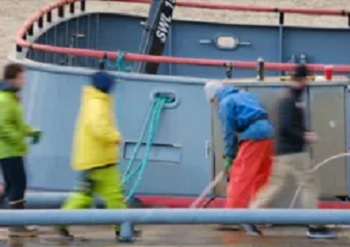
Kodiak fishermen continue to stand down amid processor price dispute
Fishermen should have been setting their gear on Sunday morning for the opening of Kodiak’s biggest Tanner crab fishery since 1986. But the boat harbor was almost full, dozens of vessels were stacked high with empty crab pots. At the coffee shop downtown right near the docks, fishermen lined up for free coffee instead. Frank Miles owns the fishing vessel Sumner Strait, a 58-foot limit seiner and has fished commercially for nearly 50 years. His first Tanner season around Kodiak was in the early 80s, when he chopped bait for a local boat. “But I never in my wildest dreams thought that we’re gonna get offered $2.50, it really is a slap in the face,” said Miles. >click to read< 07:29
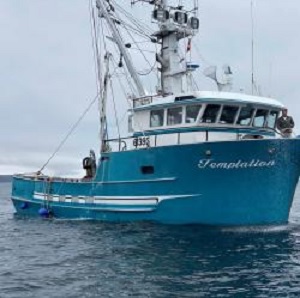
Electronic monitoring comes to Gulf of Alaska pollock fishery
Kiley Thompson knows the fishery well. He has been fishing in Alaska waters for nearly 30 years. After getting a job in college fishing for salmon, this eventually became his full-time profession. Today, he fishes along with three crew members in the Gulf of Alaska pollock fishery on F/V Decision, a 58-foot seiner/trawler based in Sand Point, Alaska. ‘The biggest challenge for us is getting observers, and you can end up losing fishing time waiting for them to arrive,’ Kiley Thompson said. In the face of these challenges, the Gulf of Alaska fleet turned to emerging electronic monitoring technologies. >click to read< 07:48
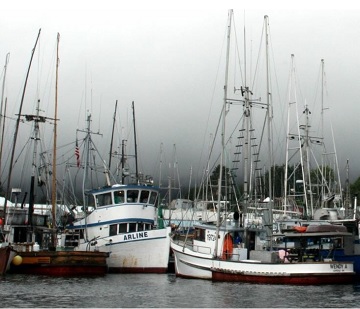
Sitka Assembly considers helping Southeast trollers in legal fight that could shut down the fishery
The Seattle-based environmental group Wild Fish Conservancy wants to stop the Southeast troll fisheries, which they say harm an endangered population of orcas. And in December, a federal judge in Washington issued a report that puts the fisheries at risk of closure. The Alaska Trollers Association is a defendant in the 2020 suit against the National Marine Fisheries Service. Sitka fisherman Matt Donohoe is the president of the Trollers Association. He says they object to the report and expect their legal expenses to increase. “Anyone claiming that Southern Resident killer whales are starving because Alaska trollers were taking food from the mouths of their babies would be laughed out of court. That’s what we thought,” >click to read< 11:48
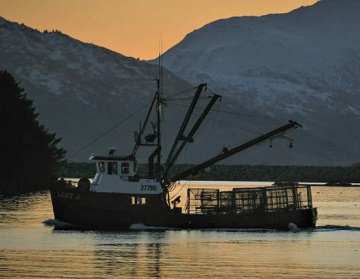
Kodiak fishermen stand down to protest low tanner crab prices
Kodiak’s biggest tanner crab fishery in nearly 40 years is set to open on Sunday, but the fleet is standing down. Fishermen say they won’t go fishing for the prices offered by local canneries. It’s the latest wrinkle on a winter fishing season already impacted by closures and strikes. Processors in Kodiak offered $2.50 per pound for tanners when negotiations started earlier this month. Kevin Abena is the secretary and treasurer for the Kodiak Crab Alliance Cooperative, which represents about 120 permit holders in the fishery. He said since then, all of Kodiak’s canneries haven’t budged from their initial price. “We haven’t been given anything to consider. $2.50 isn’t the number that we’ll consider,” Abena said. >click to read< 16:00
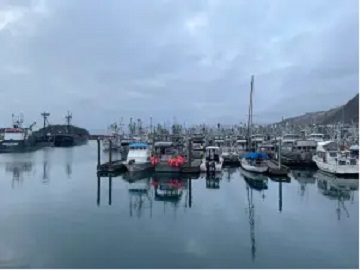
Kodiak fishermen gearing up for biggest tanner crab season in decades
Kodiak’s tanner crab fishery opens on Sunday, Jan. 15 and it’s a whopper – this year’s harvest levels are the biggest they’ve been in nearly 40 years, and fishermen are gearing up for a big season in more ways than one. Darren Platt owns the fishing vessel Agnes Sabine. It’s a 48-foot seiner – normally, he goes out for salmon – sometimes herring – and this is his fourth season fishing for tanner crabs. He said this year, there’s been a buzz in both of Kodiak’s boat harbors. “It looks almost like pre-salmon season,” he said. “There’s a lot of boats that haven’t fished tanner crabs in a while, or maybe have never fished it and so they’re just getting geared up now. And so the docks have been pretty darn busy for December and January.” >click to read< 12:15
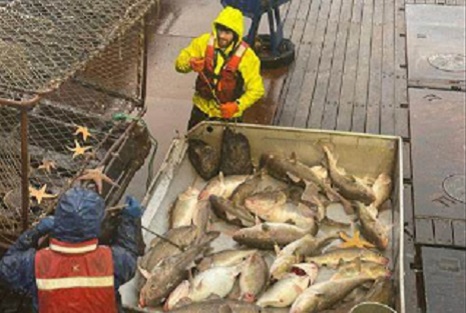
The Informal Strike. Bering Sea cod fisherman fight for better catch price
The Bristol Bay red king crab fishery has been closed for two years, and along with it, Bering Sea snow crab have abruptly disappeared, So when a group of Bering Sea fishermen recently heard they’d be getting paid less than they hoped for cod this winter season, they figured they couldn’t afford to just sit by. But that’s exactly what they did. Rather than head out right away to the fishing grounds and set their gear like they usually do on the New Year, nearly 30 boats dropped their anchors or docked up in port, waiting on better news. “Trident posted a substantially low price for cod this season, but no other processors would post anything,” said Chris Studeman, captain and co-owner of the 104-foot fishing vessel Kevleen K. “And they all expected us to just go fishing with the good faith that they’ll make it right in the end. And you can’t really run an operation with the hope that somebody will make it right in the end.” >click to read< 20:49

Coast Guard tows disabled 38-foot fishing vessel with 2 people, 1 dog to safety in Juneau, Alaska
Coast Guard Station Juneau crewmembers towed a disabled vessel with two people and one dog aboard to Juneau, Alaska, Sunday. A Station Juneau 45-foot Response Boat-Meduim crew arrived on scene at approximately 8 p.m. Saturday evening and towed the disabled 38-foot fishing vessel Solstraal 25 nautical miles to Statter Harbor at approximately 2:30 a.m. Sunday morning. Watchstanders in the Sector Juneau command center received the initial distress call over VHF channel 16 at approximately 5:30 p.m. from the individuals in distress. >click to read the rest<17:06
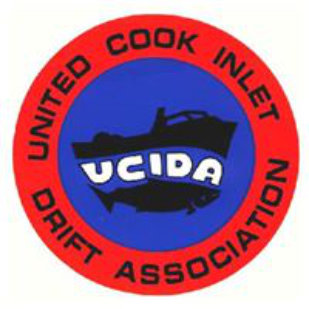
Council has 4 months to fix Cook Inlet salmon fishery management plan
The future of the Cook Inlet salmon fishery is again in the air as the North Pacific Fishery Management Council debates how to manage it after a federal court ruled that it has to write a new plan. It’s been six years since a federal court ruled that the council’s decision to remove Cook Inlet from a federal management plan and defer entirely to the state was illegal. The council initially decided to remove Cook Inlet in 2012, a decision that the United Cook Inlet Drift Association challenged in court. In 2016, the court agreed with the association, ordering the council to create a new federal management plan that includes the federal waters of Cook Inlet. >click to read< 09:47
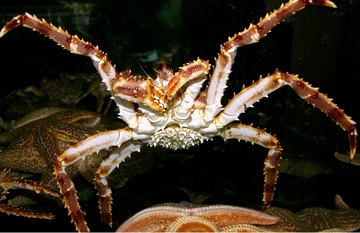
Fishery disaster aid and nearly $500 million worth of Alaska projects included in omnibus budget bill
Aid to Alaska fishermen, companies and communities was included in the year-end omnibus appropriations package that won final passage on Friday. The $300 million in aid funding follows official disaster declarations issued last week by U.S. Commerce Secretary Gina Raimondo for Alaska salmon and crab fishery failures dating back to 2020, as well as some salmon failures in Washington state dating back to 2019. The $300 million in total disaster aid “is a great start for much-needed money to help fishermen and communities pay their bills,” Jamie Goen, executive director of Alaska Bering Sea Crabbers, said in a statement. >click to read< 10:01
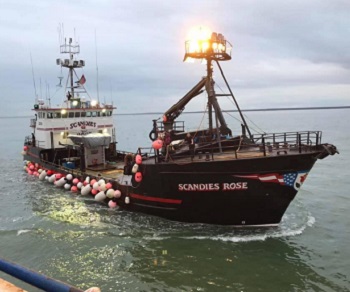
Nearly 3 years after deadly sinking, debris from F/V Scandies Rose finds its way to a family in Kodiak
Seven men were on board the F/V Scandies Rose when she went down during stormy weather in the waters off Sutwik Island near Chignik, on New Year’s Eve, 2019. Two survivors were plucked from the water in the hours after the vessel sank by Coast Guard rescue crews. But five crew members were never found and presumed dead. Those included the ship’s captain, Gary Cobban Jr. and his son David Cobban, both from Kodiak. The ship, a 130-foot crabbing boat, was enroute from Kodiak to fishing grounds in the Bering Sea and stacked with 198 crab pots when it sank. Now, nearly three years later, those buoys and other pieces of the ship have started washing ashore, bringing closure to Gerry Knagin and some of the other family members of the crew members lost. >click to read< 13:32
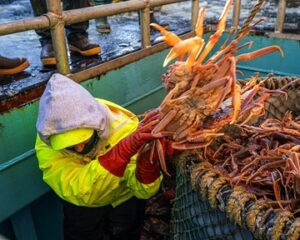
$300M in fisheries disaster relief makes it into federal spending bill
A massive congressional appropriations bill made public Tuesday includes $300 million in disaster assistance for fishing families and communities buffeted by downturns in Bering Sea crab as well as some Alaska and Washington salmon harvests. The full House and Senate still need to vote on the spending package. The $300 million in Alaska and Washington fisheries disaster funds is aimed at direct payments to crabbers and fishers and support for research and habitat restoration, according to Washington Democratic Sens. Maria Cantwell and Patty Murray. The Washington and Alaska congressional delegations joined together to press for a fisheries disaster declaration made last week by U.S. Commerce Secretary Gina Raimondo.The full House and Senate still need to vote on the spending package. >click to read< 16:06
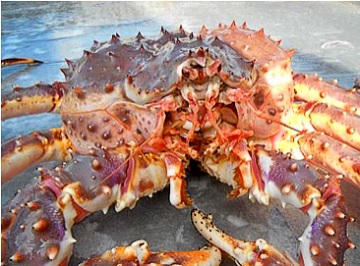
Alaska crab fishery collapse seen as warning about Bering Sea transformation
Less than five years ago, prospects appeared bright for Bering Sea crab fishers. Stocks were abundant and healthy, federal biologists said, and prices were near all-time highs. Now two dominant crab harvests have been canceled for lack of fish. For the first time, the Alaska Department of Fish and Game in October canceled the 2022-2023 harvest of Bering Sea snow crab, and it also announced the second consecutive year of closure for another important harvest, that of Bristol Bay red king crab. What has happened between then and now? A sustained marine heat wave that prevented ice formation in the Bering Sea for two winters, thus vastly altering ocean conditions and fish health. “We lost billions of snow crab in a matter of months,”,,, >click to read< 18:54

Disaster declaration unlocks potential federal aid for Alaska crabbers
A Commerce Department disaster declaration for Bering Sea crab and some Alaska and Washington salmon fisheries sets the stage for an end-of-the-year push to secure federal funds to help fleets and communities. The declaration announced Friday covers the Bristol Bay king crab harvests suspended for the past two years, and the snow crab harvest that next year will be canceled for the first time ever. Other fisheries covered by the declaration include the 2021 western Alaska Kuskokwim River salmon harvests as well as 2019 salmon fisheries in the Puget Sound and the 2020 Washington ocean salmon fisheries. >click to read< 08:04
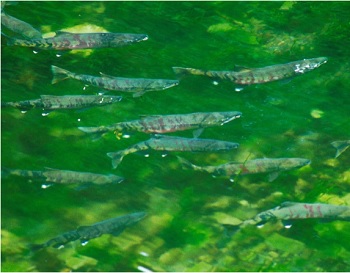
Alaska task force’s final report calls for new rules and more research to address seafood bycatch
Gov. Mike Dunleavy, who created the task force a year ago, released the group’s final report late Thursday. “I look forward to working with task force members and stakeholders to do everything we can to get more fish to return to Alaska’s waters,” Dunleavy said in a statement. The collapse of salmon runs vital to western Alaska — and public complaints that too many salmon were being intercepted at sea before returning to spawning grounds — triggered the creation of the Alaska Bycatch Task Force. However, its work extended to bycatch of various crab species and halibut. To some degree, bycatch is unavoidable, the task force said. >click to read< 09:10
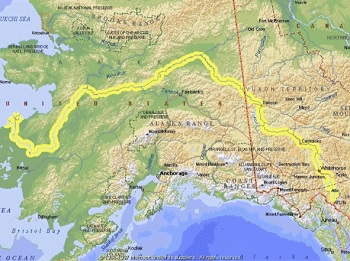
New study proposes to uncover where chinook salmon could be dying en route to Yukon
The state of Alaska is proposing new research to track dwindling chinook salmon numbers this spring, and it’s possible the study could eventually extend into the Yukon. This week, members of the bilateral Yukon River Panel met in Anchorage, Alaska, to brainstorm ways to help the salmon, which undertake one of the longest salmon migrations in the world. It’s during this migration, though, that tens of thousands of salmon seem to go missing every year. >click to read< 10:23
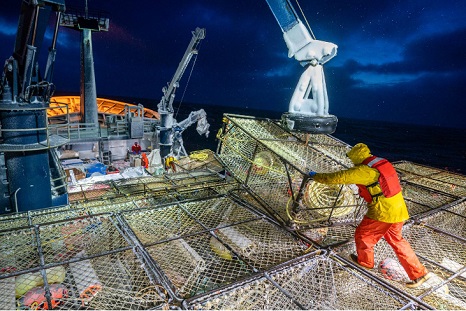
Bering Sea crab collapse spurs push for stronger conservation measures
For Bering Sea crabber Gretar Gudmundsson, December is a month for preparing his two boats for the winter harvest season. But not this year. For the first time, the winter snow crab season has been scuttled. The move has upended seasonal rhythms, and the financial stability of a crab fleet already slammed by a two-year shutdown of the fall harvest of red king crab. “We didn’t ship up any groceries. We didn’t recruit any crew. We’re not laying on fuel. Nothing is happening,” Gudmundsson said. Crabbers are pressing for more restrictions on pollock fleets, which deploy large cone-shaped trawl nets to scoop up more than 3.2 billion pounds annually of this fish in the biggest single-species harvest in North America. >click to read< 11:55
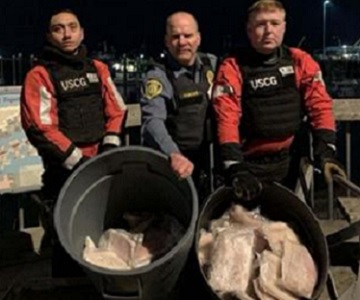
Busted! – Coast Guard, NOAA seize illegally caught fish near Homer, Alaska
A Coast Guard law enforcement boarding team seized illegally caught fish near Homer, Alaska, Wednesday. The Naushon crew seized the catch and escorted the vessel to Homer where a NOAA OLE representative took possession of the catch upon arrival at the pier. A Coast Guard Cutter Naushon boarding team discovered halibut aboard a commercial IFQ halibut vessel that was not documented in the vessel’s logbook. Additionally, the halibut was filleted to where the size and number of fish could not be determined. >click to continue< 15:49
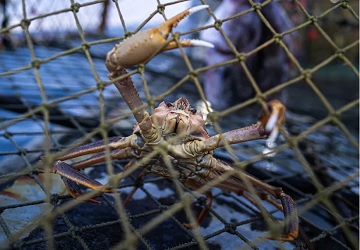
Decline of Bering Sea snow crab fishery demands swift action
Billions of crabs have vanished off the coast of Alaska, and with them, the fishing season for the Bering Sea crab fleet. This is grim news for a fleet that has fished crabs under science-based catch limits for years, providing healthy wild-caught seafood to the world and bringing jobs and income throughout Alaska and the Pacific Northwest. It’s also bad news for the communities of the Bering Sea, like St. Paul Island, where the economy is almost entirely dependent on the snow crab fishery. >click to read< 20:44
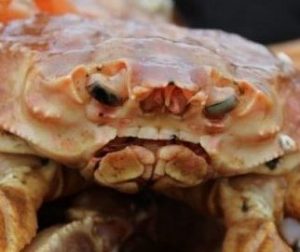
Did climate change really kill billions of snow crabs in Alaska? Here’s what experts say
Some fishers and crab experts have put forward a different idea: They’ve suggested that fishing, particularly the unintentional capture of crabs in fishing gear known as trawls, also contributed to the loss of the snow crab, or at the very least, impeded the species’ recovery from low population levels. The snow crab fishing season closure has amplified a chorus of concerns around Alaska’s trawling industry — mainly from within the fishery sector itself — and the knowledge gaps around its potential impact on fisheries. >click to read< 08:29
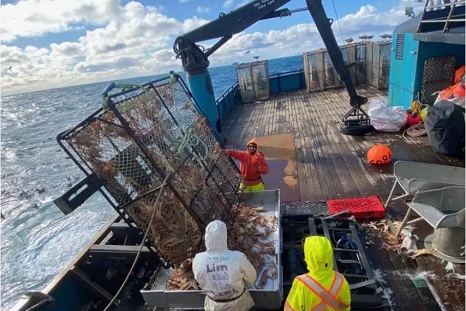
Disaster requests for Bering Sea crabbers highlight difficulty of getting financial relief to fishermen
The current process of getting financial relief to fishermen is cumbersome and takes a long time, but Bering Sea crabbers are hoping the plight of the snow crab population might change the way financial relief is delivered to fishermen. Gabriel Prout is a second-generation Bering Sea crab fisherman from Kodiak; he owns the F/V Silver Spray with his dad and brothers. He said there’s one big problem with the current process for handing out fishery disaster funding. “If you’re going to have a fishery disaster request program, you should be able to make it so the money is getting into the hands of those affected very quickly,” said Prout. Right now, it takes years for money to reach skippers and their crews. >click to read< 13:44
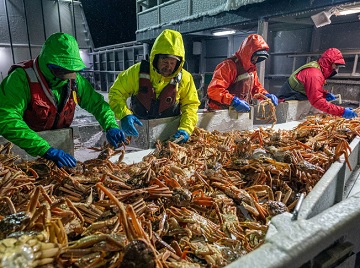
Alaska, Washington senators team up to seek disaster declaration for closed crab harvests
Sens. Lisa Murkowski and Dan Sullivan of Alaska and Sens. Patty Murray and Maria Cantwell of Washington sent the request to U.S. Commerce Secretary Gina Raimondo. The senators asked the secretary to act “as quickly as possible” to invoke the disaster declaration provision of the primary law governing marine fisheries, the Magnuson-Stevens Fishery Conservation and Management Act. “Many of these fishermen and businesses hail from both Alaska and Washington, and the impacts of these fishery disasters extend far beyond our states to consumers across the United States and the world,” the senators’ letter said. The State of Alaska puts the estimated loss of ex-vessel value – the amount paid directly to fishers for their catches – at $287.7 million,,, >click to read< 09:16






